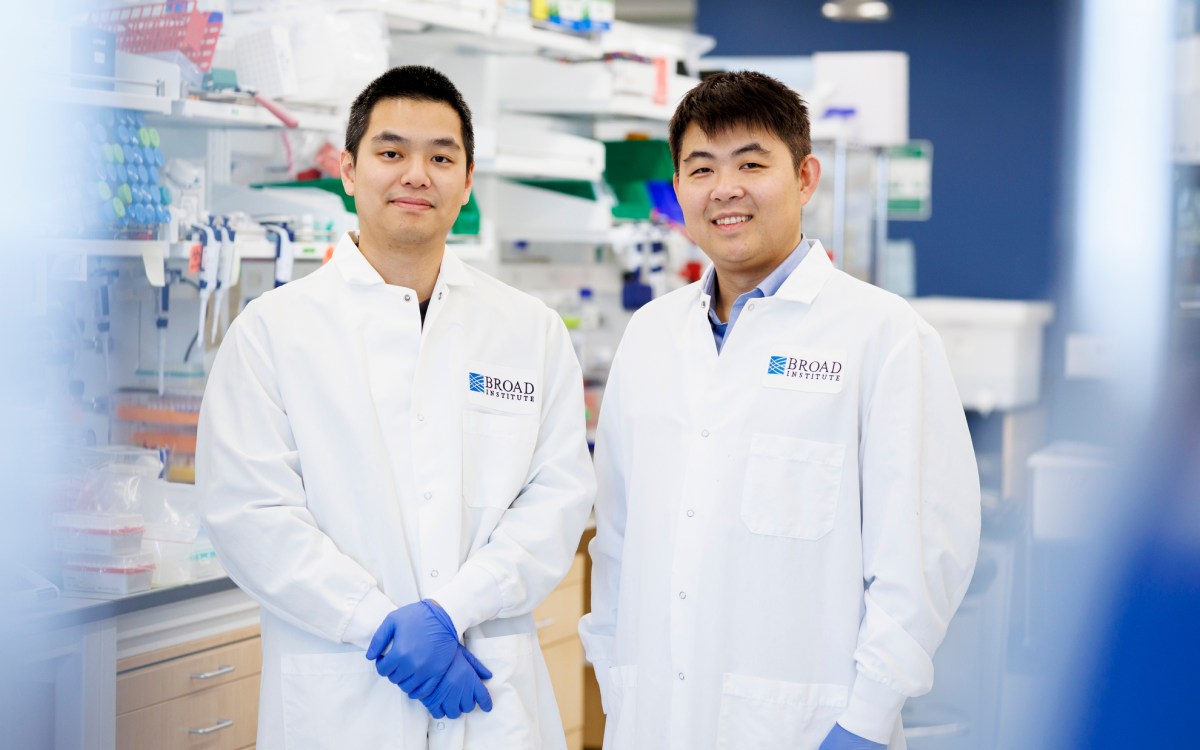Science & Tech
-

A ‘cocktail’ recipe for brain cells
Stem cell biologists discover how to regenerate type damaged in ALS, spinal cord injuries

-

When you do the math, humans still rule
Harvard’s Lauren Williams, a MacArthur ‘genius,’ joins international effort to challenge notions of AI supremacy
-

‘Imagination’
Less like a picture, more like a video game? Cognitive scientist explains how we ‘see’ what isn’t real.
-

Breaking chess’s rating stalemate
Ranking skill can be tricky when the best players draw more than they win, so a Harvard statistician invented a new method

-

How AI deepfakes have skirted revenge porn laws
Limits unclear when explicit images of individuals look real, but are digitally generated
-

How did that cancer cell become drug-resistant?
Researchers find way to create microscopic archives of gene activity to gain insights into how, why changes happen

-
First Milky Ways found at edge of universe
One key question that has puzzled astronomers for decades is: When did the first stars and galaxies form after the Big Bang occurred? The answer — very quickly! Astronomers Rennan…
-
New moons found around Neptune
Astronomers have discovered three new moons of Neptune, boosting the number of known satellites of the gas giant to 11. These moons are the first to be discovered orbiting Neptune…
-
Reading ancient campfires
Ofer Bar-Yosef, Harvard’s MacCurdy Professor of Prehistoric Archaeology and head of the Peabody Museum’s Stone Age Laboratory, is working in the New Stone Age, known as the Neolithic, when Homo…
-
A multiracial society with segregated schools
The nation’s public schools are becoming steadily more nonwhite, as the minority student enrollment approaches 40 percent of all U.S. public school students, almost twice the share of minority school…
-
New study suggests staggered boards hurt shareholders
Staggered boards hurt shareholders of hostile bid targets even when a majority of the board is made of independent directors, and they do not appear to benefit shareholders of targets…
-
Strong public support for spraying against mosquitoes
The opening study of the Project on Biological Security and the Public found that one-third (33 percent) of Americans who live in areas where there are a lot of mosquitoes…
-
Hypergiant star erupts
In the year 2000, the star Rho Cassiopeiae, n the constellation of Cassiopeia, lost more mass than in any other stellar eruption observed by astronomers. An international team of astronomers,…
-
New research questions competition in corporate charters
The dominant state in attracting the incorporations of publicly traded companies is, and has long been, the state of Delaware. Although home to less than one-third of one percent of…
-
Young star cluster found aglow with mysterious X-ray cloud
Known as RCW 38, a star cluster covers a region about 5 light years across. It contains thousands of stars formed less than a million years ago and appears to…
-
Researchers debate origin of language
Birds sing, chimps grunt, and whales whistle, but those sounds fall far short of expressing the richness of their experiences. Their lack of language goes to the question of why…
-
Matthew Shair imitates, improves on nature
Matthew Shair and his students work in “protein trafficking.” Genes in living cells carry instructions for making proteins essential to life. These proteins have to get from place to place…
-
Where do you want your building?
Humans are changing location more frequently and in greater numbers than ever before in history. But at the same time, the electronic revolution is allowing them to remain in contact…
-
Researchers regenerate zebrafish heart muscle
A research team led by Mark T. Keating showed that zebrafish can regenerate heart muscle within two months after a severe injury. The team, from the Howard Hughes Medical Institute…
-
New 3-D mammography system may improve breast imaging
Researcher Elizabeth Rafferty of the Massachusetts General Hospital Breast Imaging Service described initial results of a study comparing a new technique, called digital tomosynthesis, to standard mammography. Among the new…
-
Geographical information systems conference showcases the future
Begun as a mapping software decades ago, geographical information systems, known as GIS, today functions to manage different time- and place-dependent data and allows different variables to be projected together,…
-
Exploring black political thought, now and then
Professor Michael Dawson’s most recent book, “Black Visions: The Roots of Contemporary African American Mass Political Ideologies” (University of Chicago Press, 2001), brings a historical perspective to black political ideologies.…
-
Boston bike messengers experience very high injury rate
Bike couriers have become as a much a part of the urban landscape as sky-scrapers and traffic-clogged streets. Boston messengers collectively make between 3,000 and 4,000 deliveries on a given…
-
Scientists look inside antimatter
“We have obtained the first glimpse inside an antihydrogen atom, and this is a significant step on the way to precision measurements that will allow matter/antimatter comparisons to be made,”…
-
McElroy says it’s time to stop seeing global warming as political issue
Michael B. McElroy, Gilbert Butler Professor of Environmental Studies and director of Harvard’s Center for the Environment, is among the scientists who since the 1970s have been using paleoclimatic data…
-
Prying the lid off the FDA
Even though asthma is responsible for more deaths and more hospitalizations than arthritis in the United States, the greater political influence of arthritis sufferers prompts the federal Food and Drug…
-
Regrowing missing teeth may someday be possibility
Regrowing missing teeth may someday be a possibility, based on work by a team of scientists at the Forsyth Institute, an independent, Harvard-affiliated research organization specializing in oral and craniofacial…
-
Missy Holbrook investigates the world of plants
Every day an oak tree moves hundreds of gallons of water up from the soil and out, in evaporated form, through its leaves. “Mechanically, it’s a pretty substantial feat,” says…
-
Beetle mania
Grain weevils alone cost the global economy about $35 billion, or a third of the world’s grain crop, every year. Various other beetle species damage dozens of crops including bamboo,…
-
Harvard science historian publishes results of unprecedented 30-year census of Copernican masterpiece
First published in 1543, Nicholas Copernicus’ De revolutionibus orbium coelestium introduced the world to the concept of a sun-centered universe. In it, Copernicus detailed how the motions of the sun,…
-
Genetic sonograms may reduce need for amniocentesis
Radiologist Beryl Benacerraf is a Harvard Medical School clinical professor of obstetrics, gynecology and reproductive biology at Brigham and Women’s Hospital. Benacerraf, a handful of like-minded maternal-fetal ultrasound specialists, and…
-
Putting bacteria to work
A nautical group of bacteria known as Prochlorococcus removes carbon dioxide from air and fixes it into the carbon content of their own tiny bodies. The more carbon dioxide they…
-
Undergraduates observe Rwandan attempts at justice
The Rwandan genocide memorial was a tiny one-room church, pervaded still by a penetrating stench. On a table in the church was a pile of human skulls and femurs, a…
-
Website saves wet books
Wondering what to do if you discover a bunch of old books are floating in backed-up sewer water or if a parchment manuscript gets soaked by an automatic sprinkler? The…
-
When problem-solving is a problem
If an ill-timed delivery left them short of linens, nurses observed by Harvard Business School doctoral student Anita Tucker found a way to borrow from another unit. Such initiative taking…
-
Researcher wins Nobel Prize for work in X-ray astronomy
Riccardo Giacconi worked at the Harvard-Smithsonian Center for Astrophysics from 1973 to 1981. During that period, he led the development of the Einstein X-ray Observatory, which was launched in 1978.…


